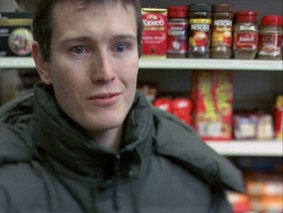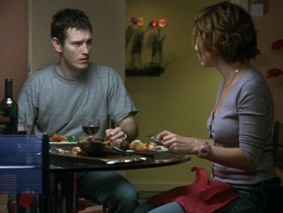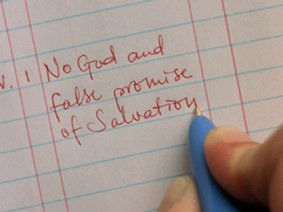| |
"'Every Debit must have its corresponding Credit,' explained Christie, "Perhaps every bad must have its corresponding good. An extension might be called Moral Double-Entry." |
| |
B.S.
Johnson – Christie Malry's Own Double-Entry |
Christie
Malry is a simple man. Determined to improve his lot
by becoming an accountant, he instead uses his new-found
understanding of double-entry book-keeping to draw up
a reckoning between himself and society at large, placing
a value on every wrong done against him with the aim
of extracting a similar value back through increasingly
extreme means.
B.S.
Johnson's 1973 novel Christie Malry's Own Double-Entry is a fascinating work on both a narrative and technical
level, working as both a novel and an anti-novel,
an example of post-modernist literature written long before post-modernism
became the creative curse that it is today. Its central
concept was straightforward, but is inventively and at times
ingeniously handled, while its casual rejection of the moral
values of society is both surprising and strangely satisfying.
Throughout the story, Johnson draws the reader's attention to the fact that
we are reading a novel, and in one chapter engages
in direct dialogue with his lead character about the
nature of the narrative he is participating in. Anyone attempting
to make a film of such a work, one that is going to
connect with an audience and affect them on an emotional and intellectual level, is taking on one hell of a challenge.
That screenwriter Simon Bent and director Paul Tickell
took on this task is admirable, and that they didn't completely
nail it is simultaneously unsurprising and a little disappointing.
But they have still created a film that intermittently
captures the anarchic spirit of the novel and that is
still a very worthy and sometimes satisfying work. That it has, however, remained
largely unseen in the very country in which it was created
is more than a little dispiriting.

So
what happened here? Why was this BAFTA-nominated film not more widely released
and seen? I mean,
how many inventive, original British features actually
appear each year? And when one does come along,
why is it almost immediately buried? Well there are
a number of reasons, none of which cut any ice with me.
The novel itself, though acclaimed and recognised as
an important work, is not as widely known nowadays as
it probably should be, and is hardly going to find itself on
the GCSE English reading list. No instant
tie-in hook there, then. And then there is the character of Christie
himself. He's a million miles from the do-good heroes of
the Hollywood mainstream, a man who effectively declares war
on society and quickly graduates from small-time
vandalism to mass murder. Christie is an amoral domestic terrorist
who destroys not for political or ideological reasons,
but to balance his reckoning with anyone he has issues with, which would probably include a sizeable proportion of any potential audience. Starting
to see the problem? Well there's more. Having completed the film, the filmmakers were having trouble nailing a distribution deal,
and some months later it still had not made its way into UK
cinemas. Then on September 11th 2001, the World Trade Centre attacks transformed western attitudes to terrorism of any sort, and no-one
wanted to touch this movie. It was to be almost another
year before Christie Malry was to get
it's overdue cinema release, and even then it was pulled after only a few screenings. It eventually crept out on
DVD, virtually unnoticed and at a budget price. This is all
wrong. I may have issues with certain aspects of the
film (and the DVD, as it happens), but it's still a
classily made, often inventive, and in many ways unique
work that has one thing most recent British and American
movies tragically lack: it has balls.
The
traditional route to audience identification of creating a sympathetic lead character really wasn't open to the filmmakers
here. Malry is an urban terrorist with essentially
selfish motives, but screenwriters Simon Bent and Paul
Tickell have recognised up front that a character does
not necessarily have to be likable to be interesting,
and Christie is certainly that. Shrugging off the book's
own pre-post-modernist style, director Tickell adopts
a very formal approach, a mixture of carefully composed,
locked-down compositions, smoothly executed tracks and eye-catching
top shots. This gives the film a very observational
feel and creates a reality that is also a little unreal,
something reflected in the non-naturalistic
but still engaging performances. Nick
Moran plays Christie as a man who is two steps away from grounded reality,
an ordinary bloke who has been slowed down to 33rpm. He perhaps takes Johnson's description of him as "a simple man"
a little too literally, but still nicely underplays a part that could so easily have been camped up. When
he tells girlfriend Carol (referred to simply as The Shrike
in the novel) that he loves her, for example, there is an
almost comic edge to his vocal delivery, one underscored by an oddly convincing sincerity. We never get really close to Christie,
but the nature of his quest and his own moral ambiguity
keep him at just the right distance for an audience to find interesting and not feel betrayed by his actions
or behaviour.

It
is to the filmmakers' considerable credit that they
have been largely faithful to the novel, which can't
have been an easy sell when trying to raise the budget,
and the film is at its strongest when it adheres to Johnson's vision. This goes beyond the recognition
factor of seeing something you admire in print being reproduced
faithfully on screen; for evidence of this, you only
have to look at the scenes that were not in the novel,
which for the most part simply do not measure up. The
most glaring example is the attempt to expand on the
novel's intermittent quotes from Fra Luca Bartolomeo Pacioli (the Benedictine
monk who, in his 1494 work Suma de Arithmetica Geometria
Proportioni et Proportionalita, was the first to be credited
with devising a system of double-entry
book-keeping) by intercutting Christie's story with a series of extended
fifteenth-century flashbacks detailing Pacioli's relationship
with Leonardo Da Vinci. Lushly photographed and sincerely
performed, they may well tell an interesting tale in
themselves, but it isn't half as interesting as the
one being told about Christie in modern times. And broken up into small
segments which have only a minimal link to the main
story, they are difficult to engage with on more than a superficial level, acting as interruptions to the real meat of the film. Without these flashbacks,
which have the content, character and tone of a more
traditional historical drama, Christie Malry's
Own Double-Entry would come close to anarchist
cinema, (largely) refusing to pass judgment on its
protagonist and genuinely fascinated and at times almost delighted by his actions. For a conservative
audience this will definitely pose a problem, but for those of us depressed by the twee Britishness
of the likes of Notting Hill, Love
Actually or Wimbledon and the like, such an approach is genuinely liberating.
Well,
almost.
There
is a purity to Johnson's vision of Malry's odyssey that
makes the story work as well as it does. Though
the film-makers have largely adhered to this approach, they have
added the suggestion, confirmed by the commentary
track, that Christie is also irresistibly drawn to the
sound of breaking glass, supposedly triggered by
the noise a bottle being smashed during his conception.
This can't help but dilute the single-minded simplicity
of Christie's purpose, suggesting that rather than making
a deliberate decision, he is in fact responding to an
unconscious need that has been with him since birth.
This also gives rise to one of those scenes
that always get my back up, where a song on the soundtrack
spells out what his happening on screen – as Christie
blows up a tax office, we are treated to a (rather
good, it has to be said) version of I Love the Sound
of Breaking Glass, which is followed with
an on-screen hailstorm of, yes, broken glass. This is
a real shame, as elsewhere Luke Haines' simple but haunting
score is most effectively used.
Spoiler
alert: If you don't want advance information
on scenes towards the end, and the end itself, skip
past this section by clicking here.
It's
after this that the cracks really start to show and
the inventiveness and originality begin to slip.
A scene in which Christie's mother and
his workmate Headlam turn up in a bar to play Angel
and Devil and rather obviously debate the morality of
Christie's actions is clunky and unnecessary, and the
pub revolutionaries, who were represented only by their
dialogue in the book, stretch the concept of cartoon
characterisation a little too far.
A bigger problem,
especially for those who know the novel, is how the story concludes (last chance to bail out!). In Johnson's original, Christie discovers a lump which is diagnosed as cancer, which very rapidly
brings his life to an end (in a chapter ironically titled Now
Christie really does have Everything), an event whose random nature he is unable to build into his reckoning
and results in him ultimately canceling his debt.
In the film he is blown up by one of his own bombs
on the way to destroying the Houses of Parliament, a
twist that can't help but seem contrived and judgemental
– he who lives by the bomb, dies by the bomb. It almost feels designed to provide a sense of poetic justice for those who regard Christy's actions as unforgiveable, deflating the film's previously potent sense of liberation and moral ambiguity. This is
followed by a funeral that seems to mock Christie's
antipathy towards religion, and a completely unnecessary and horribly misjudged scene
in which his girlfriend Carol discovers Christie's ledger and his drawings and plans, a scene made all the more
unpalatable by a cheesy round-up montage of earlier
scenes.
All
of which is a huge shame, as together with the distracting
trips back to the fifteenth century, this cuts an intriguing and sometimes brave piece of work off at the knees. But I would still suggest that the bits that do work are a lot more inventive, interesting and
chance-taking than most other recent British films are in their entirety. The sense of refreshingly amoral anarchy survives largely intact, and the technical
handling is often very impressive, repeatedly belying
the film's small budget. The film, like Johnson's
story, appeals to that dark little part of us that, after
a day of being repeatedly wound up by the thoughtless idiots, wants to go nuts in a supermarket
with a tommy gun. And I've personally got a soft spot for
any film in which the lead character cheerily dismisses
the church as corrupt and deceptive, and reasons
that he is owed recompense by society because of "No
God and false promise of salvation."
In
some ways this is a very good transfer. Colours are strong,
sharpness is good and black levels are generally spot on.
There is minor artefacting in areas of one colour in places,
but it is rare. The problem is that we have not the anamorphic
widescreen print the film demands, but a cropped 4:3 one,
which really does mess with Reinier van Brummelen's handsome
photographic compositions. To make matters worse, the opening
credits are in non-anamorphic 1.85:1. Thus, despite a decent
selection of extras, there is a sense of a half-arsed job
here that director Tickell should complain bitterly about.

The
soundtrack is Dolby 2.0 stereo, but the separation is often
very good and the tonal range excellent. If you have DSP
modes on your amp, re-channel the bass through the subwoofer
and you get some kick-arse low frequencies in places. 5.1
would have been nice, of course, but as Dolby 2.0 tracks
go, this is a good 'un.
Considering
this disk can be picked up for about a fiver and the picture
has been cropped, the number of extras on offer here is
genuinely surprising.
The
first is the best, a screen-specific commentary with director Paul Tickell and lead actor Nick Moran,
though neither are identified by name on either the menu
or the track itself (the DVD case misleadingly
suggests that there are two seperate commentaries). This is an
informative and sometimes entertaining listen, giving plenty
of background on the making of the film, and certainly
answered some questions I had about how they obtained permission to film a scene in which Christie poisons the water supply at a real water processing plant. There are, however, a couple of technical issues. Putting aside the
fact that there is no film sound at all (comments on dialogue
are thus a tad abstract), there are a couple of loud pops,
and the commentary itself is out of sync with
the screen action by a good fifteen seconds, resulting
in sometimes animated discussion on a shot or sequence that has not yet appeared. This is shoddy stuff, and should have been picked
up on before release.
The trailer sells the film rather
well (not much use if no cinema shows it, of course) and
is presented non-anamorphic 1.85:1, so is in the correct
aspect ratio, something the main feature is not, which has the effect of rubbing more salt in the aspect ratio wound.
The photo gallery is a one minute
montage of production stills set to music. To be honest
they all look as if they've been grabbed from the film
itself. A 1.85:1 version, no less.
Film
and characters is a 4 minute featurette about, well, the film and its
characters. The interviews are not presented full screen,
but in small windows while animated lines form boxes on
screen. Hmmmm. Moran casts Malry here in a surprisingly
negative light.
Novel
to screen is a three-and-a-half minute featurette
consisting of interviews with writer Simon Bent, director
Paul Tickell and lead actor Nick Moran in which they discuss
the process of adapting Johnson's book for this film.
The line/box style of the previous featurette is reproduced
here.
Soundtrack runs six minutes forty-nine seconds and discusses the
creation of the music score, central to which is an interview
with composer Luke Haines. As with the preceding featurettes,
the presentation is a mixture of lines and boxes, but
again the content is interesting.
What
the papers said is a collection of carefully
selected short extracts from favourable reviews of the
film. A somewhat odd and rather insecure inclusion, as
by the time you get to this you will already have formed
your own opinion of the film, and one sentence is hardly
going to make you consider it in a different light.
Interview
with Paul Tickell is a textual extra in
which the director is interviewed by Richard Marshall
of 3 A.M. Magazine and discusses his approach to the film,
dismissing the idea of shooting dogme-style because he'd
already been down that path with his previous film Crush
Proof and because "every fucker does it."
He also has some interesting thoughts on British cinema
in general and those working in it. There are quite a
few pages to this and it makes for a worthwhile read.
Finally Alternative opening sequence is just that, lasting for two minutes and really making the 4:3 cropped picture of the main feature smart
by being non-anamorphic 2.35:1. There is no sound on this
sequence.
Several
years ago, when a misguided attempt was made to revive the
old TV music review show Juke Box Jury, singer Siouxsie
Sioux was asked to pass comment on an
innofensive but somewhat banal new single and memorably complained
that: "It's not dangerous, and so in a way, it is." This
nicely sums up a depressingly high percentage of recent
British cinema. It's nice to be entertained, but
art, great art, should definitely be dangerous. Christie Malry's
Own Double-Entry may, thanks to some clunky moments
and some misjudged wanderings from the source novel, falls
some way short of being great cinema, but it is technically
accomplished, imaginative and bold. And yes, in a time
when viewpoints are narrowing and terrorist paranoia is
rife, it is dangerous. And that is something to celebrate.
As
for the DVD, well the film deserves better. At a time when
anamorphic widescreen transfers are almost a given, what
the hell are we doing with this 4:3 cropped print? The extras
are rather good, but even here there are signs of shoddiness.
But with the film still struggling to find a large audience,
a re-release is unlikely, and it can be picked up very cheaply.
So check it out – flawed Outsider Cinema is still a damned
sight better than most of the more polished mainstream fare
out there.
|